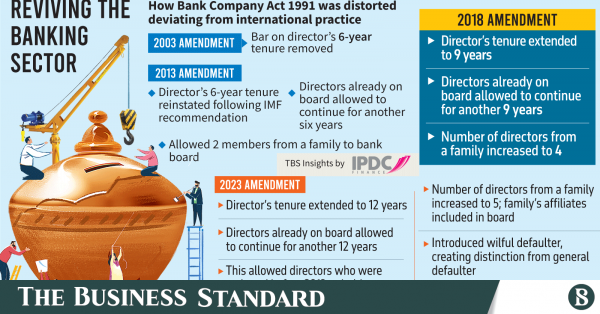The Bangladesh Bank Proposes Comprehensive Amendments to Banking Laws
Date: 14 August 2025 | Last Modified: 14 August 2025
Addressing Governance Failures in the Banking Sector
The Bangladesh Bank is undertaking a pivotal reform of the nation’s banking laws aimed at rectifying historical governance issues driven by familial dominance and political influence. The proposed amendments to the Bank Company Act are designed to fortify corporate governance, thereby enhancing stability in a sector plagued by scandals and escalating non-performing loans over the past two decades.
Proposed Changes to Board Composition
Central to the reform is a focus on reducing the control of influential families. The Bangladesh Bank suggests a significant reduction in the number of board members from one family, limiting it to two. Additionally, it seeks to cut the maximum continuous tenure of directors from 12 years to six, aiming to dismantle entrenched familial power within bank management.
Impact of Familial Dominance
For years, dominance by select board members has led to substantial detriment to the banking sector, particularly during the past 15 to 20 years. Notorious conglomerates, like S Alam Group, have been implicated in siphoning off vast sums, often resulting in widespread corruption and loss of public trust.
Barriers to Political Influence in Banking
The amended draft further aims to prevent political figures—such as government ministers and members of parliament—from serving on bank boards. This is essential for ensuring clear accountability and independence in management, with at least 50% of board members required to be independent directors, enhancing transparency in governance.
Encouraging Foreign Investment
To bolster international investment, the proposed changes would relax shareholding limits for foreign investors. Currently, individuals are capped at holding 5% of bank shares, but the Bangladesh Bank envisions strategies to attract strategic foreign partners, potentially allowing up to 100% ownership in some cases.
Tackling Defaulters and Enhancing Oversight
Another crucial aspect of the draft is the elimination of the distinction between general and wilful defaulters, ensuring equitable treatment in policies. Moreover, state-owned banks will now adhere to the same governance regulations as private banks, enhancing overall oversight in the banking system.
Insights from Financial Experts
Economic experts have weighed in on the necessity of these changes. Former Deputy Governor Rumee Ali emphasized the importance of rigorous implementation to ensure effectiveness. Zahid Hussain, a former World Bank economist, echoed this sentiment—asserting that diminishing familial control is a crucial step toward better banking practices. Others emphasized the need for further stakeholder consultations to maximize the amendments’ potential positive impact.
